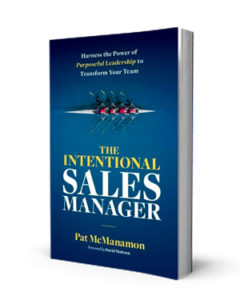By Pat McManamon, Sandler Training
Editor’s note: The following is an excerpt from “The Intentional Sales Manager – Harness the power of purposeful leadership to transform your team” by Sandler Trainer / Author / Speaker/ Sales Coach Pat McManamon
“Sales manager.”
 These two words encompass what is arguably the most challenging role within any company. In my experience, it is also the most misunderstood role.
These two words encompass what is arguably the most challenging role within any company. In my experience, it is also the most misunderstood role.
A manager is not a salesperson. They are two totally different roles. Sometimes we lose sight of that. Our job as managers is not to close sales. Very often, however, we act with the intention of closing sales. This common problem is compounded by the reality that the metrics that can create a viable scorecard for salespeople are a little harder to identify at the management level.
Managers who become truly effective as leaders of sales teams embrace their management role by establishing for themselves minimum standards of performance and activity that are very different from what salespeople are expected to do. These standards connect to the goals of developing their people … and coaching them so that they get better at executing what they know how to do. This embrace of the sales manager’s role does not happen without a consistent, disciplined effort guided by intentional decisions.
My hope is that The Intentional Sales Manager will help current and aspiring sales managers to see the potential hazards of not being focused and intentional when it comes to developing their people and themselves. My aim is to support them as they inspire others to leverage their personal goals as a means of sustaining their own continuous growth by sustaining the continuous growth of others.
An all-too-common theme
While writing it, I found myself reflecting on the countless sales teams I’ve worked with over the years. I realized that there was an all-too-common theme among teams that found themselves in trouble and looked to Sandler for help: managers and salespeople who held themselves and their organizations back … because they could not see their own blind spots, and were not ready to set up a plan – an intention – for overcoming them.
There is always something to learn, something to improve, something to see more clearly. Of course, it’s possible, and perhaps even likely, that you as a manager may notice the blind spots of others before you recognize your own. Don’t compare what they’re doing to what you might do in a similar situation. That’s not your role. Instead, ask, “If I were to be intentional about helping this person to get better, what is the one thing I could do that would help them most?” And then act.
Many sales managers, it should be emphasized, evolve from a sales role. As a salesperson it’s easy to measure your impact because of metrics related to sales volume, dollar amounts, averages, ratios, and new accounts.
When managers accept their new responsibility, they are told to do things like set the strategy, define the culture and develop your people. These are all things that are critical to the role of manager, but not that they are also activities that have a long-term perspective. What will you be doing each day? You can easily edge your way back into being a “senior salesperson” unless you are intentional about staying in the manager role.
Growth as a manager can be an elusive quest … until the manager begins to realize just how much he or she doesn’t know.
The truly intentional manager quickly realizes that learning and growth are interchangeable, and that they must never stop learning and growing. Other managers, by contrast, learn only enough to sustain themselves in their first management assignment and then, sadly, come to believe that they have arrived and they have no need to learn further or look for a coach who can help them learn to show humility and vulnerability. Don’t be one of them!
Top 10 behaviors
The Intentional Sales Manager is based on real-life situations of the challenges faced by sales managers with whom I’ve worked. The following takes place after some important lessons learned:
It had been a couple of months since Tom had first sat down one on one with each of his salespeople. The format of the team sales meetings had changed dramatically since then. No longer was the focus on the department’s production numbers and each salesperson’s updates on each of the accounts in his or her pipeline. (Those discussions were held for the private meetings, which had a clear coaching focus.) The team sales meetings now followed an agenda based on input of the sales team. The salespeople had told Tom that they wanted to be updated about company issues, and that they wanted to master, with Tom’s help, the Top 10 behaviors of successful sales professionals. With Tom’s facilitation, they agreed to work as a group on these top 10 behaviors, all of which support the performance of top performing salespeople.
- Lead generation
- Building relationships
- Qualifying opportunities
- Making presentations
- Serving customers
- Account management
- Territory development
- Building a cookbook for success
- Continuous learning
- Execution of a proven selling system
Be INTENTIONAL about managing these Top 10 behaviors in your salespeople!
Learn more about increasing sales and success with a proven, systematic approach to selling. Contact us at salestips@repertoiremag.com.
Start reading The Intentional Sales Manager for free: https://www.solutions.sandler.com/resources/sandler-books/intentional-sales-manager
THE INTENTIONAL SALES MANAGER, by PAT MCMANAMON
Copyright © 2019, Sandler Systems, Inc. All rights reserved. Do not reproduce or circulate.